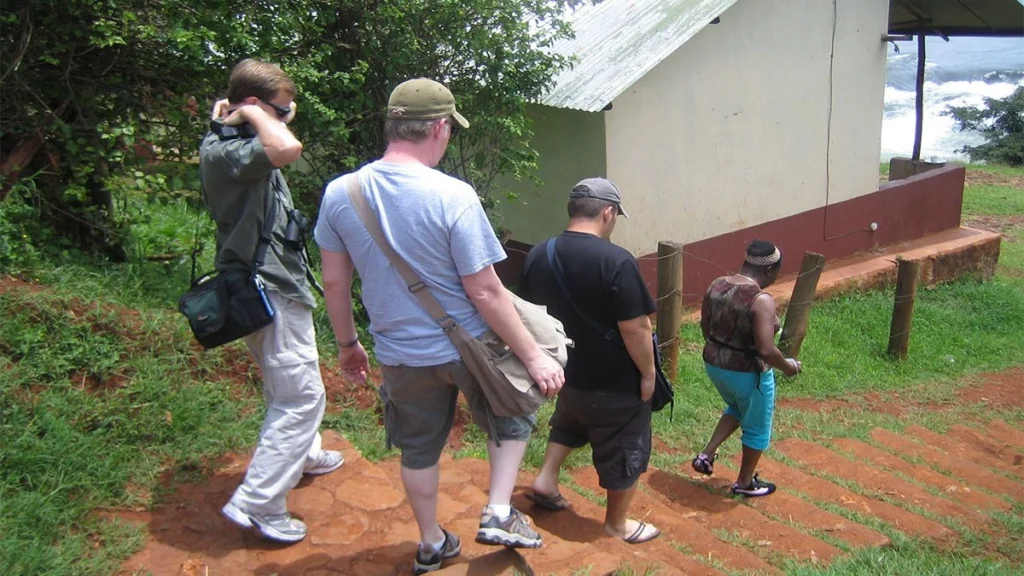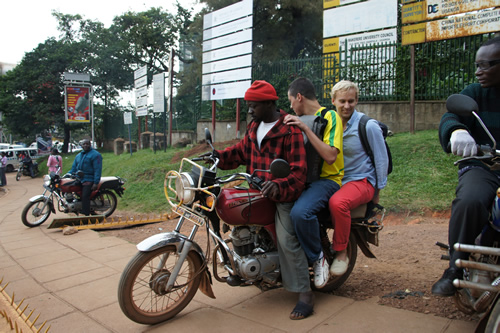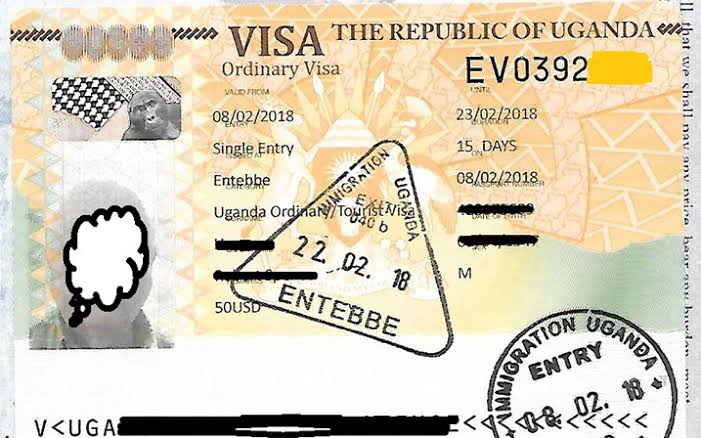
Exploring Boda Boda Culture in Uganda | Experiya Tour Company
October 29, 2025
Visiting the Uganda Museum in Kampala | Experiya Tour Company
October 29, 2025Are Ugandans Friendly to Foreign Visitors?
Uganda, famously known as the Pearl of Africa, is one of those rare destinations where visitors often arrive as tourists but leave feeling like family. While the country’s breathtaking scenery — from the misty peaks of the Rwenzori Mountains to the shimmering waters of Lake Victoria — draws travelers from around the world, what truly captures their hearts are the people. Ugandans are renowned for their warmth, kindness, and hospitality. For anyone wondering whether Ugandans are friendly to foreign visitors, the simple answer is yes — profoundly so.
Whether you are wandering through Kampala’s busy streets, exploring rural villages, or trekking with mountain gorillas in Bwindi Impenetrable National Park, you’ll quickly discover that the people you meet are often just as memorable as the landscapes themselves. In Uganda, a smile is never far away, and greetings are offered as naturally as the rising sun.
Let’s explore what makes Ugandan hospitality so special, what visitors can expect when interacting with locals, and why this friendliness is deeply rooted in the nation’s culture.
The Heart of Ugandan Hospitality
Uganda’s hospitality is not just a social habit — it’s part of the country’s DNA. Across all regions and cultures, Ugandans share a deeply ingrained sense of community and respect for others. Guests, whether local or foreign, are treated with honor and care.
In Luganda, the widely spoken language in central Uganda, there’s a popular saying: “Omugenyi ajja na Mukama”, which means “A visitor comes with God.” This reflects the cultural belief that guests bring blessings. Therefore, hosting and welcoming others — even strangers — is considered both a privilege and a responsibility.
You’ll see this hospitality in small gestures: a shopkeeper offering you a warm greeting, a villager inviting you to share a meal, or a guide going out of their way to make your trip comfortable. Ugandans take pride in making visitors feel safe and appreciated.
The Ugandan Smile
One of the first things travelers notice about Uganda is how often people smile. Whether you’re bargaining in a market or boarding a bus, you’re likely to be met with open, friendly faces.
This genuine warmth comes from a cultural emphasis on kindness and good relationships. Ugandans believe that friendliness builds trust and harmony, values that are central to community life. For many visitors, this creates an atmosphere of comfort and belonging. Even in the busiest urban settings, strangers will greet you with “Hello!” or “How are you?” — a gesture that might surprise travelers used to more reserved cultures.
Everyday Interactions: A Culture of Respect
In Uganda, respect and friendliness go hand in hand. The way people interact — whether among themselves or with foreigners — reflects deep cultural values of humility, politeness, and care for others.
When greeting someone, it’s common to shake hands, exchange pleasantries, and inquire about their wellbeing before starting a conversation. Even casual interactions often include warm, genuine small talk. Ugandans don’t rush through social exchanges; they take the time to connect.
In rural areas, where community life is even more tightly knit, visitors are often treated with special interest. Locals might gather to chat with you, ask where you’re from, or even offer you food or fruit from their gardens. This curiosity comes from a place of kindness rather than intrusion.
Children are especially enthusiastic. In villages and along country roads, it’s common to hear them call out “Mzungu!” — a Swahili word meaning “foreigner.” It’s not an insult but an expression of excitement and fascination. Many children will wave, smile, or even run alongside you for a while.
How Ugandans View Foreign Visitors
Foreign visitors in Uganda are generally seen as honored guests. Ugandans take pride in their country and enjoy showing it off to outsiders. They’re often eager to share stories about local customs, wildlife, and culture.
For many Ugandans, meeting visitors is also an opportunity for cultural exchange — a chance to learn about the world beyond their borders. Because of this, travelers often find themselves welcomed with open curiosity and respect.
In restaurants, markets, or public spaces, locals are quick to help if you look lost or confused. Even if someone doesn’t speak your language fluently, they’ll make an effort to communicate. In Uganda, the effort to make you feel at home is part of the experience.
A Blend of Politeness and Warmth
One of the most endearing traits of Ugandan hospitality is its balance between warmth and politeness. Ugandans are friendly but also respectful of boundaries. They are rarely pushy or overbearing, and they value humility in conversation.
You might be approached by locals who want to talk, share advice, or sell crafts, but interactions are almost always polite and cheerful. If you’re not interested, a kind “no, thank you” is usually enough, often followed by a smile and a friendly farewell.
This respectful nature is especially evident in rural settings, where traditional values are strongest. Visitors who greet people properly, dress modestly, and show interest in local customs are often rewarded with heartfelt hospitality — sometimes even invited into homes for tea or a home-cooked meal.
Uganda’s Multiethnic Warmth
Uganda’s friendliness also stems from its incredible cultural diversity. The country is home to more than 50 ethnic groups, each with its own language, traditions, and customs. Despite these differences, the spirit of unity and hospitality binds people together.
Whether you are in Buganda, Busoga, Ankole, or Acholiland, you’ll find communities that share similar values of generosity, respect, and openness. This diversity also means that as you travel across Uganda, you’ll experience many forms of friendliness — from the Buganda’s formal courtesy to the Acholi’s expressive warmth.
Each group has its unique way of welcoming visitors, but the underlying sentiment is always the same: you are welcome here.
The Power of Hospitality in Tourism
Uganda’s welcoming nature has become a cornerstone of its tourism industry. Many travelers who come to see gorillas, wildlife, or scenic landscapes end up falling in love with the people. In fact, numerous visitors return not only because of the attractions but because of the friendships they formed during their stay.
Local guides, hotel staff, and community hosts often go above and beyond to make sure guests feel safe and comfortable. It’s not unusual for guides to share personal stories, teach local phrases, or invite guests to visit their villages.
Cultural encounters — such as attending traditional dances, visiting markets, or sharing meals — offer travelers an opportunity to experience Uganda’s hospitality firsthand. These moments of connection often become the most cherished memories of a trip.
Safety and Comfort for Foreign Visitors
Uganda’s friendliness extends to how the country treats its visitors. The government and tourism authorities place great emphasis on ensuring that travelers feel safe and respected. Ugandans generally value peace and harmony, and foreigners are rarely made to feel unwelcome.
Of course, like anywhere in the world, it’s wise to travel sensibly — be mindful of your belongings, follow local customs, and work with reputable tour operators. But overall, Uganda is one of the friendliest and most peaceful destinations in East Africa.
In fact, many visitors remark that Uganda feels “like home away from home.” The combination of warm smiles, genuine care, and community spirit creates a sense of belonging that’s hard to find elsewhere.
Tips for Building Genuine Connections in Uganda
If you want to experience Uganda’s friendliness to the fullest, a few small gestures can make a big difference:
- Learn a few local greetings. Saying “Oli otya?” (How are you?) in Luganda or “Webale” (Thank you) goes a long way in showing respect.
- Smile and greet people openly. Ugandans appreciate politeness and friendliness.
- Be patient and listen. Conversations are valued more than rushing through interactions.
- Respect local customs. Dress modestly in villages and remove shoes when entering someone’s home.
- Show appreciation. Complimenting someone’s hospitality or thanking them sincerely strengthens bonds.
By approaching interactions with respect and openness, you’ll find that Ugandans quickly open their hearts to you in return.

The Friendliness That Lasts a Lifetime
Many travelers leave Uganda with more than photos and souvenirs — they leave with friendships. It’s not uncommon for visitors to stay in touch with guides, hosts, or community members long after their trip ends. Ugandans remember their guests fondly and often keep in touch through social media or WhatsApp.
This lasting friendliness makes Uganda not just a place to visit, but a place to return to. It’s the kind of warmth that lingers — a connection that continues to draw people back again and again.
Why You Should Travel With Experiya Tour Company
To experience Uganda’s legendary hospitality in the most authentic and meaningful way, travel with Experiya Tour Company. Experiya understands that Uganda’s true beauty lies not only in its landscapes but in its people.
Their tours are designed to connect travelers with local communities, giving you opportunities to interact, learn, and share moments of genuine friendship. Whether you’re visiting rural villages, exploring cultural sites, or joining a family for a traditional meal, Experiya ensures that your experience goes beyond sightseeing — it’s about connection.
With Experiya’s experienced guides, you’ll not only feel safe and comfortable but also gain deeper insights into Ugandan life, customs, and hospitality. From city tours in Kampala to countryside adventures in western Uganda, every journey with Experiya is an invitation to experience the warmth and kindness that make Uganda truly special.
Book your next trip with Experiya Tour Company and discover why Uganda isn’t just a destination — it’s a feeling. A place where strangers become friends, and every smile tells a story of welcome.




